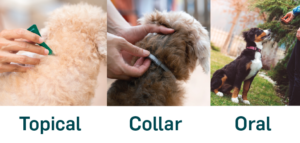Where, How, and Why You Should Check Dogs For Ticks

Written by Audrey Jenkins
Whether your dog spends hours outside or merely leaves the comfort of your home for a bathroom break, it is absolutely imperative that you conduct thorough tick checks following every outing. Although there are many tick preventative medications, no medication will provide complete protection and checking your pet is still considered a key aspect of tick prevention. Veterinarians suggest that these checks should include the entirety of your dog’s body, including these harder-to-reach areas:
- Underneath the armpits
- Between the toes
- Around the tail
- Behind and inside the ears
Finding and removing ticks
Ticks can be surprisingly difficult to locate, so be sure to brush your fingers carefully through your pet’s fur. You’ll need to use a reasonable amount of pressure in order to feel the small bumps created by embedded ticks. These ticks can vary significantly in size based on their species and how long they’ve been attached. Be prepared to encounter an insect as small as a pinpoint or as large as a blueberry. You can use a tick spoon or tweezers to grasp the tick and pull it from your pet’s skin. It does require a small amount of force and if you are having any trouble you can always call your local veterinary hospital and a technician or doctor can assist you.
Tick checks are by no means enjoyable, but they are definitely important; ticks carry a number of dangerous diseases, and the last thing you want is for your dog to contract Ehrlichia or Lyme disease. Ticks can transmit diseases in as little as 6 hours and up to 48 hours. This makes it all the more important to check your pet after every excursion outdoors. Not only can some of these illnesses cause extreme discomfort for your dog, they may even lead to death in very extreme cases. Ticks can also transfer from your dog to your bed/furniture/other pets and even you.
If a tick borne disease is transmitted to your pet, it can take up to 6 months for it to present signs. If you notice your pet become lethargic or lame in any or all limbs, call and make an appointment with your veterinarian. These diseases are best treated when signs appear with a long course of antibiotics. Most cases see improvement within 48 hours after starting the medicine.
What about cats?
It is good to mention that cats can also get ticks and they should be removed as soon as possible. Cats, however, do not have the same threat of developing tick-related illness as dogs do.
Prevention
It is best practice to prevent your pet, dog or cat, from picking up ticks. The best way to do this is with flea and tick preventatives. These can be in collar form, an oral chewable, or a topical liquid that is applied in between your pet’s shoulder blades on the skin after parting the fur or hair. Talk to your veterinarian about what type and brand is best for your pet’s lifestyle.

Next time your dog returns from an outdoor excursion, conduct a thorough search — the brief time commitment is worth the additional years of fun with your pooch and money saved on disease treatment!